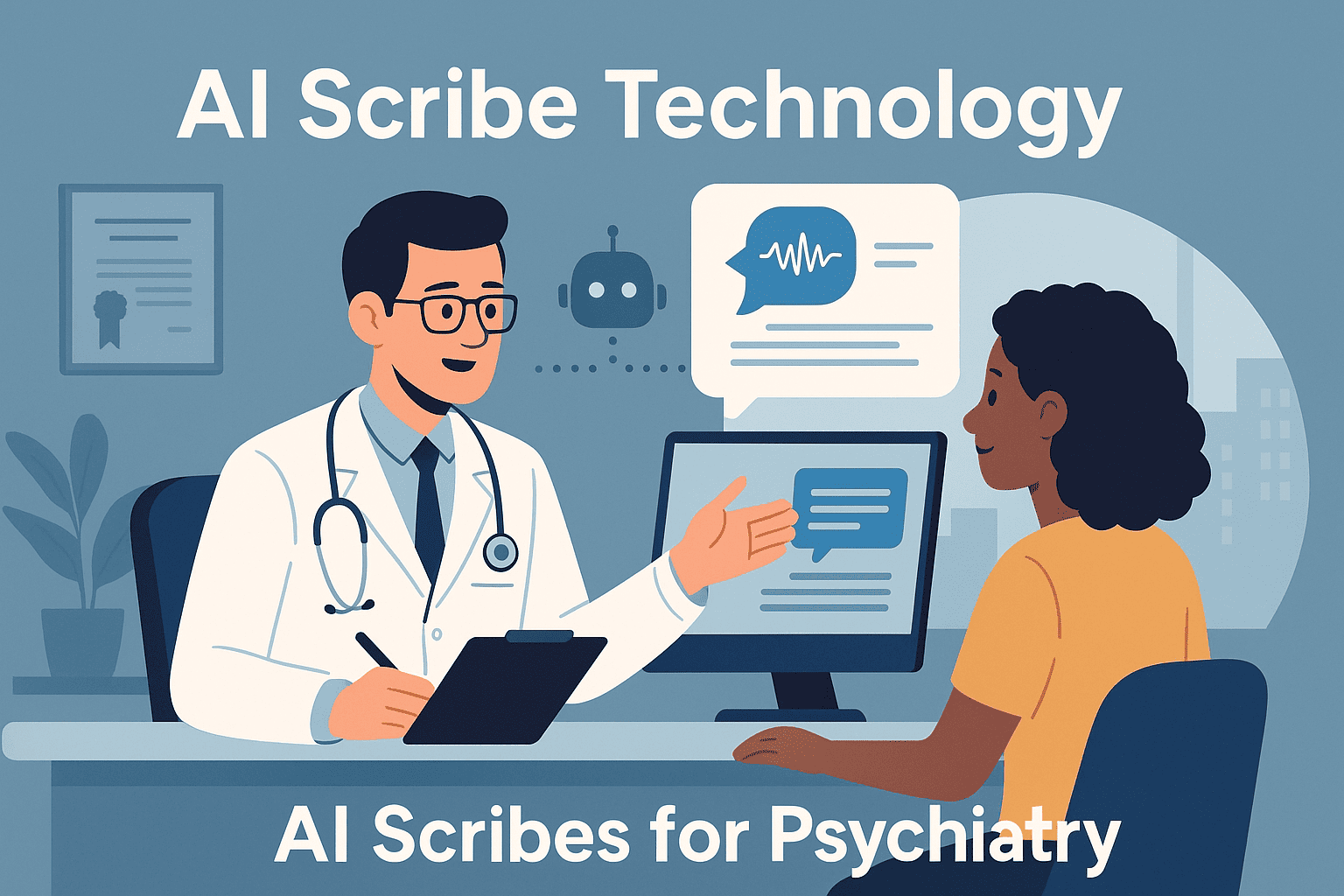Updated on: July 12, 2025
Psychiatry is one of the most human-centered fields in medicine. Each session demands full presence, deep listening, and a safe space for patients to open up. But the reality? Psychiatrists often spend as much time documenting as they do treating.
Every nuance, every shift in tone, every behavioral cue—must be carefully recorded. Add EMR fatigue and administrative overload, and it’s no wonder many mental health professionals are feeling burned out.
That’s where AI medical scribes for psychiatry come in. Built specifically for the subtle needs of mental health practitioners, platforms like DocScrib are helping psychiatrists focus more on patients—and less on paperwork.
What Makes Psychiatric Notes Unique?
Unlike other specialties, psychiatric notes go beyond physical symptoms. They require documenting:
-
Patient affect, mood, and thought content
-
Behavioral observations and non-verbal cues
-
Long-form narrative summaries (often over multiple sessions)
-
Psychosocial context and treatment rationale
-
Medication adjustments and therapy goals
It’s not just what the patient says—but how they say it—that matters. And missing a single detail can alter a diagnosis or treatment plan.
Enter AI-Powered Psychiatry Scribes
AI psychiatry scribes are specialized virtual assistants that listen to clinical conversations and generate real-time, structured psychiatric notes.
Powered by natural language processing (NLP) and machine learning, these tools are trained on psychiatric terminologies, therapy frameworks, and note formats like:
-
SOAP (Subjective, Objective, Assessment, Plan)
-
DAP (Data, Assessment, Plan)
-
BIRP (Behavior, Intervention, Response, Plan)
-
MSE (Mental Status Exam)
With DocScrib, these formats can be customized to your workflow and documentation needs.
How It Works in a Psychiatry Setting
-
Session Begins
The AI scribe listens passively (via mic or app), with no disruption to rapport. -
Real-Time Comprehension
It captures not just transcription but clinical intent—recognizing terms like “flight of ideas,” “pressured speech,” or “blunted affect.” -
Note Generation
A draft is generated with key behavioral insights, diagnoses, medications, and the psychiatrist’s plan. -
Clinician Review & Approval
You review/edit as needed and send to the EMR—done in minutes, not hours.
Benefits of AI Scribes for Psychiatrists
🧠 More Face Time, Less Screen Time
Maintain eye contact and patient trust without the distraction of typing notes mid-session.
📋 Consistent Mental Status Exams (MSE)
Auto-populate core observations like appearance, thought process, and insight with high accuracy.
🕒 Save 1–2 Hours Daily
No more late-night charting. Reclaim your evenings without compromising on quality.
🧾 Better Therapy Documentation
Narrative notes are more complete, especially for complex psychiatric cases or long-term care.
🔐 HIPAA-Compliant
DocScrib ensures full data privacy, BAA availability, and encrypted records.
🧍♀️ Solo or Group Practice Friendly
Whether you’re running a private tele-psychiatry service or part of a behavioral health group, AI scribes scale effortlessly.
Real-World Use Case: Psychiatry Meets Ambient AI
A solo psychiatrist in New Jersey using DocScrib reported:
-
90% reduction in documentation time
-
Improved note quality with more accurate MSE fields
-
Increased appointment volume by 15% without burnout
-
“Patients feel more heard when I’m not typing the whole time.”
In group practices, AI scribes help standardize documentation across clinicians, ensuring insurance compliance and higher audit readiness.
DocScrib for Psychiatry: Key Features
At DocScrib, we’ve developed features designed specifically for mental health professionals:
-
Specialty-Trained NLP for psychiatric language and therapy models
-
Custom Templates (SOAP, BIRP, MSE, etc.)
-
Medication & Diagnosis Capture with DSM-5 vocabulary
-
Recurring Patient Context across sessions
-
Telehealth Compatible—works seamlessly with Zoom, Doxy.me, or in-person
-
Behavioral Health Billing Support with correct CPT code suggestions
Why Psychiatrists Choose DocScrib Over Generic Scribes
| Feature | Generic Scribe | DocScrib for Psychiatry |
|---|---|---|
| Trained on DSM-5 Terms | ❌ No | ✅ Yes |
| MSE Auto-Population | ❌ Manual | ✅ Automated |
| Template Customization | Limited | Fully Flexible |
| Behavioral Context Tracking | ❌ No Memory | ✅ Session Continuity |
| HIPAA & Mental Health Focus | Basic | Full Behavioral Compliance |
Addressing Common Questions from Psychiatrists
Is this suitable for therapy sessions or only medication management?
Yes—DocScrib captures narrative dialogue, therapy techniques (e.g., CBT, DBT), and behavioral insights.
What about patient privacy during sensitive sessions?
AI scribes operate silently and securely in the background. All data is encrypted and reviewable before submission.
Does it support telepsychiatry?
Absolutely. DocScrib integrates with popular telehealth platforms, enhancing documentation during remote consults.
Can I use it for progress notes and initial intakes?
Yes. You can generate structured intake summaries and recurring progress notes effortlessly.
Getting Started with DocScrib Psychiatry Scribes
Switching to AI doesn’t need to be complex. With DocScrib:
-
Sign up and select “Psychiatry” as your specialty
-
Choose your template (SOAP, BIRP, etc.)
-
Start your sessions—DocScrib does the rest
-
Review, edit, and sync to your EMR in one click
⚡ Most psychiatrists are fully onboarded in under 48 hours.
👉 Book Your Demo Now to experience AI documentation made for mental health.
Conclusion: A Calmer Mind for the Mind Healer
As psychiatry evolves in complexity, your documentation tools should evolve too. AI scribes aren’t replacing you—they’re supporting you, so you can be more present, more precise, and more effective.
With DocScrib’s psychiatry-specific tools, clinicians can reduce administrative drag, reclaim clinical clarity, and improve patient experience.
If you’re a psychiatrist tired of late-night notes or missing the nuances that matter, the answer isn’t working more—it’s working smarter.
